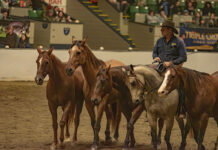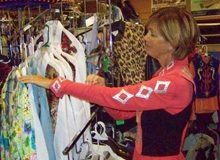
It starts innocently enough. We amuse dinner parties with inconceivable stories of all those horse owners who give the rest of us a bad rap, the high maintenance ones. These are the group of people who do and say things that the rest of us cannot relate to. They make themselves impossible to fathom, uncomfortable to be around. Then, eventually in the telling of a story along the way, we pause to admit that defining “high maintenance” is a matter of perspective. This means, even while it’s incomprehensible, someone else might be story telling about us right now.
Whoa. I realized suddenly how fussy and nitpicky my instructions sounded. Was it possible that I bordered on high maintenance? I figured I better develop a quick framework for separating myself, hopefully, from full-blown pain-in-the-butt status. This way, I could do a self-assessment the next time I was guffawing over someone else’s mind-boggling absurdity. I could be sure I was not just telling stories about myself. Here is my outline of considerations that might define us equine enthusiasts as high maintenance.
A complicated nutrition/supplement program tops the list, and might be the first sign that you’re making life with horses more complicated than it needs to be. I know owners who, by the time they have assembled their horses’ daily regime of supplements, medications, and feeds, don’t have time to ride. They drive all the way out to the barn to spend an hour mixing, mashing, and dosing their horses’ food but don’t actually get him out of the stall to enjoy or exercise him. The feeding program soon takes on a life of its own, which makes it nearly impossible for these owners to ever take a vacation. Nobody else is competent or reliable enough to follow the minutiae of steps involved.

If your horse’s feeding regime requires an advanced degree in nutrition science, you might be high maintenance.
Mind you, this intensive feeding routine brings these owners a form of satisfaction and pleasure. If they were to streamline or cut it out, they might lose a small window of happiness each day. But here it’s probably worth noting that within community settings, like barns, our own individual pleasures might stir someone else’s stress.
This brings me to the second point in my high maintenance guideline: overly frequent calls/texts/emails/messages to the barn owner or trainer. For as much as we each love hearing about our horse, the recipient of our messages does not love updating us. Inquiring once a day or every other day about your horse’s health and happiness is okay. More than that just gets you labeled. I like to remind my students that if I talk to them on the phone more often than my mother, they are getting a little high maintenance.
A final consideration in the community horse-keeping setting is what I call hysteria matching. Ask yourself: does your level of hysteria over issues match those around you? In other words, when you find yourself raising your voice and getting pretty worked up about the fact that someone forgot to put on your horse’s fly mask, ask if others would have this as a normal reaction. When the horse across the fence looks at yours cross-eyed, or maybe even reaches across and nips him, consider whether the frenzy you have worked yourself in to seems on par. When the night help accidentally puts on your horse’s stable blanket instead of his rain sheet, do not freak out on him unless you can say for sure that your level of shrieking and harsh remarks are indeed a reasonable and acceptable means of communication.
Now, with these simple starting points for keeping ourselves from being the center of dinner party stories about neurotic horse enthusiasts, let’s assess ourselves from time to time. Let’s ensure the stories remain about those other people, the really crazy ones.
Related:
10 Things Your Barn Worker Wants You to Know
JEC ARISTOTLE BALLOU is the author of 101 Dressage Exercises for Horse & Rider.






I used to do the same thing….Feed and clean first, then NO time to ride, because by then it was too late in the day to enjoy my horse, even if I wasn’t going to ride. My best friend pointed that out to me. Now we have to watch out for each other if we are doing that bad habit…sometimes we still fall into that bad habit and we have to look out for each other. Now we have reversed it. We ride first, then clean, then prep the grain for the next day.
My problem is that I save everything, and alway :going: to find a home for some of my stuff, but never have time.
Yep, I too, spend more time brushing and cleaning barn, than I do riding.
I am very particular about the supplements I give my horses but when I take a week’s vacation I premix them in daily bags to make it easier. I’m also willing to let them skip some of their normal routine. It doesn’t hurt them to miss a few things for a week while I’m away.
dear friends unless you are a compation i don’t think horses need all of that stuff all of our mares are gorgeous pretty and fat they pasture and they get yellow salt ahd plenty of mineral blocks and they are in great shape you can fill them to full of that kind of things.
great info